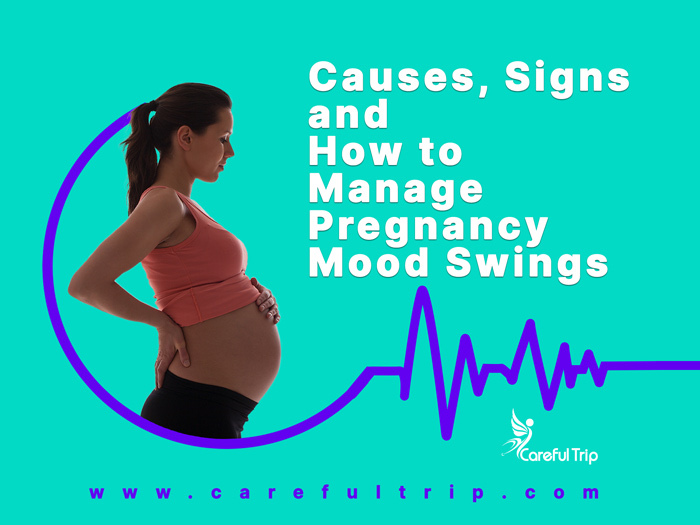
How to Manage Pregnancy Mood Swings?
For many women, premenstrual syndrome (PMS) is a common cause of the pregnancy mood swings they experience before their periods. For some people, it’s possible to feel pleased and sad simultaneously; for others, it’s possible to have strong feelings about things that normally don’t bother you, which is important for the well-being of the developing fetus. While mood swings are a normal part of pregnancy, understanding how to manage pregnancy mood swings? is essential, and some foods and supplements may help. Eating a balanced diet rich in fruits, vegetables, whole grains, and lean proteins, along with getting enough omega-3 fatty acids, may support emotional well-being. Additionally, certain supplements, such as vitamin B6, magnesium, and calcium, have been shown to help regulate mood. However, it’s essential to consult a healthcare provider before starting any new supplement during pregnancy. While you may be annoyed by your erratic pregnancy mood swings, they are completely natural and even expected throughout pregnancy. Now let’s see how to manage pregnancy mood swings? while exploring how early mood swings show up in pregnancy, especially with a new baby.
Causes of pregnancy mood swings
Hormones likely play a role in your emotional rollercoaster. In pregnancy, the body produces more estrogen and progesterone, which can cause moodiness and other unpleasant side effects, such as nausea and morning sickness exhaustion. However, biology is only one factor to consider. Regardless of the hormones, it’s understandable that you’re feeling a range of emotions now that you’re expecting.:
Depending on your pregnancy mood swings, you may be ecstatic about being a mother one minute and terrified the next. Your emotions are perfectly understandable, and you’re going to be an excellent mother or father no matter what happens.
Signs of pregnancy mood swings
Each stage of the baby’s growth might completely alter your emotions. Here is a complete list of possible signs you can experience at various stages of your pregnancy.
Fear
First trimester
During the first 12 to 13 weeks of pregnancy, many women are concerned about miscarriage. Anxiety over food and whether or not you’re doing something correctly or incorrectly could increase. For foreign patients seeking healthcare during this time, it’s important to choose operators recognized for transparent healthcare pricing. Some reputable clinics and hospitals in major cities, such as Bumrungrad International Hospital and Bangkok Hospital, are well-known for providing clear pricing structures to foreigners, ensuring patients understand costs upfront.
When you’re expecting a baby, you develop a strong desire to protect him or her. You may panic if you see blood or feel pains in your tummy. Establishing a consistent bedtime routine can also help expectant parents manage anxiety and relax before sleep.
For more information, read:
Second trimester
After the first trimester is over, entering the second trimester might be a relief. After the initial ultrasound, you’ll be relieved to find that your baby is healthy. However, if a mother is experiencing significant anxiety, it’s important to know that seeking professional help may be beneficial, as they may still be concerned about late miscarriages and other health issues.
Third trimester
During the third trimester in the United States, many women experience anxiety about giving delivery. How difficult will it be? Is a C-Section going to be necessary? These are all legitimate concerns that many people have. Before birth, it’s crucial to have a support system in place for any anxieties.
Crying without reason
All trimesters
What if you were overwhelmed with emotion when you saw a dog in the park or when you spilled milk? it’s perfectly OK.
Crying during the first trimester is normal since your hormones are changing. As the pregnancy progresses into the second and third trimesters, it is usual for women to have bouts of uncontrollable crying.
Anxiety
Pregnancy anxiety is frequent in the first trimester and continues throughout the entire nine months of the pregnancy. Perinatal anxiety affects between 8% and 10% of new mothers. Fears of miscarriage and physical feelings from your uterus are common in the first trimester. Concerns about your diet, water intake, and exercise routine are also typical.
One of the mood swings in pregnancy’s second trimester is that pregnant women may begin to worry about how quickly their bodies are expanding. To address this, learning how to manage pregnancy mood swings? Joining a support group can help, as your body may feel either too big or too little, leading to concerns about whether something is wrong. During the upcoming stages of the second trimester, you may also feel your baby’s initial kicks; however, these can be impacted by the position of your placenta, making it more difficult to detect the baby’s twitches. New mothers may find this stressful. At 28 weeks, expectant mothers are encouraged to keep a close eye on their unborn children. Anxiety over whether or not they feel their baby enough can easily turn into obsession over this issue. Knowing how to manage pregnancy mood swings? is essential, especially as the birth of the baby and adjusting to a new way of life become prevalent concerns at the end of pregnancy.
Anger
Angry pregnancy mood swings can occur at any time throughout pregnancy. When a woman’s hormones begin to rise in the first trimester, she is more likely to become irrational. In addition to the unpleasant side symptoms that accompany pregnancy, it can also be a frustrating experience (and can be hella uncomfortable). For non-pregnant persons, this can create a great deal of impatience and rage over trivial matters. Understanding how to manage pregnancy mood swings is essential for both the pregnant individual and those around them. By learning how to manage pregnancy mood swings effectively, you can foster a more supportive environment during this challenging time.
Having a poor self-image and lacking confidence in your body
Your body is adapting to the notion that you are carrying a new life inside you during the first trimester, influenced by pregnancy hormones. During the first 12 weeks, you should not expect to see many physical changes in your body. You may, however, experience some bloating and be disappointed if you find that you are unable to fasten your jeans anymore. It’s common for women to “show” about 14 weeks of pregnancy. If body image concerns and physical discomfort existed before pregnancy, this could be an exciting or difficult period. Learning how to manage pregnancy mood swings is important, as you may also compare yourself to other pregnant women who are larger or smaller than you. In the third trimester, there can be some discomfort when you’re at your heaviest weight. Intimacy can be affected because some women might be self-conscious. Even though it’s totally normal, losing or gaining weight might be stressful for some women. Understanding how to manage pregnancy mood swings can help navigate these feelings more effectively.
What are pregnancy mood swings like?
Pregnancy mood swings can feel like a rollercoaster of emotional ups and downs, prompting many expectant mothers to wonder how to manage pregnancy mood swings effectively. Women frequently report feeling elated and joyful one moment, only to face anxiety, sadness, or frustration shortly after. These emotional fluctuations are often connected to hormonal changes, along with the physical and mental adjustments that accompany pregnancy. It’s not unusual to find yourself crying over seemingly trivial matters or feeling irritable due to fatigue or discomfort. Recognizing that these mood swings are a normal part of the experience can help ease any guilt or confusion you may encounter. By learning how to manage pregnancy mood swings, you can embrace the emotional rollercoaster and ultimately gain a deeper understanding of yourself, leading to a more meaningful connection with your impending role as a parent.
When do pregnancy mood swings start?
Pregnancy mood swings and other pregnancy symptoms typically begin in the first trimester, often around the 6 to 10-week mark. This early stage of pregnancy is characterized by significant hormonal changes as your body produces higher levels of estrogen and progesterone. These hormonal fluctuations can lead to emotional changes, causing you to feel happy one moment and anxious or irritable the next. For many women, this emotional turbulence is a natural part of the early pregnancy experience, as the body adapts to the changes it is undergoing. Learning how to manage pregnancy mood swings can be vital during this time. While some may find that their mood swings stabilize during the second trimester, they may resurface as the pregnancy progresses into the third trimester, particularly as the anticipation of the upcoming birth sets in. Understanding when these mood swings and pregnancy symptoms start can help you prepare for the emotional rollercoaster that often accompanies this transformative journey and equip you with strategies on how to manage pregnancy mood swings effectively.
How to control mood swings in pregnancy?
When you’re pregnant, it’s crucial to take care of yourself emotionally and physically. Here are some ideas to aid you in managing your pregnancy emotions and pregnancy mood swings and getting back to being yourself.
Eat healthy foods
If you’ve ever been “hangry,” you know how an unwelcome outburst might result from a lack of food. Eat nutritious meals and snacks that stimulate your body, calm your mind, and help prevent panic attacks while feeling better both physically and mentally. Maintaining a steady stream of energy can help you remain composed.
Workout
To combat stress and increase your mood, breathing exercises and exercise are a must! If you feel down and out for no apparent reason, try doing some light cardio like walking or swimming. Exercising outside will help you feel much more energized and rejuvenated. Yoga and meditation, on the other hand, are extremely beneficial.
Make sleep a top priority
When you’re pregnant, it’s crucial to get enough sleep. Maintaining a regular bedtime, following a morning schedule of getting up simultaneously every day, and taking naps as needed will help you get a good night’s rest during the first three months of pregnancy.
Talk to your family and friends
Ensure that those closest to you and a trusted friend completely understand your feelings and what you are going through by talking to them about it. Educate them on the possibility that you might snap or react unexpectedly from time to time.
You may also want to connect and talk with other expectant mothers who are in a similar situation to yourself. It’s a good idea to get involved in a local community by joining an existing organization or creating a new one on social media like Facebook or Twitter.
Be gracious to yourself
Pregnancy is a grueling experience. Making matters worse is a shaky emotional state. If you have a theatrical moment or overreact to a circumstance, don’t be hard on yourself.
Forgive yourself and know that these tidal waves of rage are fleeting. Every now and then, we all need an emotional release.
Get help from a mental health professional
Anxiety, depression, and other various mental health issues, including the “baby blues,” can be a sign that something is wrong, and it’s important to seek help if you’re experiencing these symptoms. Consult an obstetrician or a psychologist if you’re having trouble coping. If you’re experiencing prenatal depression or anxiety symptoms, don’t feel bad about it!
For more information, read:
How to Manage Pregnancy Mood Swings?
Coping with the emotional changes and mood changes during pregnancy can be challenging, but there are effective strategies to help manage these feelings. First, prioritize self-care by ensuring you maintain a balanced diet and stay hydrated; this can have a significant impact on your mood. Regular physical activity, whether it’s prenatal yoga or simple walks, can also improve your emotional health by releasing endorphins. Additionally, consider journaling your thoughts and feelings to create a safe space for self-reflection. Connecting with others, such as joining a support group or talking with friends and family, can help you feel less isolated in your experiences. Lastly, don’t hesitate to reach out to a mental health professional if you find yourself struggling. They can offer valuable coping strategies tailored to your unique situation and emotional needs, ensuring you feel supported throughout your pregnancy journey.

Building personal resilience to pregnancy mood swings
Building resilience during pregnancy can be key to managing mood swings effectively. Developing coping strategies that enhance your emotional health and physical health will help you navigate the ups and downs of this unique time. Consider practicing mindfulness techniques, such as meditation or deep breathing exercises, which can ground you in moments of emotional upheaval. Establishing a support network is also essential; sharing your feelings with trusted friends, family, or other expectant mothers can provide comfort and validation. Additionally, prioritizing self-care through healthy eating, regular exercise, and adequate sleep will contribute to your overall well-being, making it easier to cope with the emotional changes that pregnancy brings. Remember, it’s okay to seek support from mental health professionals if feelings of anxiety or depression become overwhelming. Acknowledging your feelings and proactively addressing them is a vital step in building resilience throughout your pregnancy.
When to seek professional help for managing pregnancy mood swings

Recognizing the right moment to seek professional help during pregnancy is crucial for emotional health. If mood swings intensify to the point of affecting daily life, or if feelings of anxiety and sadness persist beyond typical fluctuations, consulting with a healthcare provider is advisable. Additional signs include experiencing panic attacks or having a history of depression, which may escalate during this sensitive stage. Support from a mental healthcare provider can provide invaluable coping strategies and emotional support for expecting parents.
Final Words
Now that you understand what mood swings are in early pregnancy, it’s important to remember that these emotional changes are a normal and common part of the pregnancy journey. Hormonal fluctuations, physical changes, and the anticipation of becoming a parent can all contribute to mood swings during this time. It’s perfectly okay to experience a wide range of emotions, from excitement and joy to anxiety and irritability. To learn how to manage pregnancy mood swings, don’t hesitate to share your feelings with your partner, family, or close friends—having a supportive network can make a significant difference in how you cope with emotional ups and downs. Open communication helps your loved ones understand what you’re experiencing and allows them to provide comfort and reassurance. If you find that your mood swings are becoming overwhelming, persistent, or interfering with your daily life, it’s important to reach out to your healthcare provider. Sometimes, intense or prolonged feelings of sadness, hopelessness, or anxiety may be signs of depression or another mental health concern that requires professional support. Your doctor can provide guidance, recommend resources, or refer you to a mental health specialist if needed, further helping you learn how to manage pregnancy mood swings effectively.
Remember, taking care of your emotional well-being is just as important as looking after your physical health during pregnancy. Prioritize self-care, get sufficient rest, eat nutritious meals, and engage in relaxing activities that bring you joy. If you ever feel uncertain about your feelings or mental health, seeking help is a sign of strength, not weakness. Your health and well-being—and that of your growing baby—are always worth prioritizing.
FAQ
Can you suggest practical ways to cope with pregnancy mood swings?
Certainly! To effectively cope with pregnancy mood swings, consider implementing practical strategies such as maintaining a healthy diet, engaging in regular physical activity, and ensuring you get enough rest. Connecting with emotional support, whether through friends, family, or support groups, can also create a sense of community for pregnant people during this transformative time. Additionally, practicing relaxation techniques, like mindfulness or yoga, can help ground you during moments of emotional turbulence.
How do hormonal changes affect emotions in pregnancy?
Hormonal changes during pregnancy, particularly the increase in estrogen and progesterone, can significantly affect your emotional health. These hormones influence neurotransmitters in the brain, which are responsible for regulating mood. As a result, you may experience heightened emotions, mood swings, or increased feelings of anxiety, especially if sleep deprivation occurs. Understanding this connection can help you navigate your emotional experience during pregnancy.
Is it possible to prevent mood swings in pregnancy?
While you may not be able to prevent mood swings during pregnancy due to hormonal changes completely, there are strategies to help manage them in your daily life. Focus on maintaining a healthy lifestyle by adopting a balanced diet, engaging in regular exercise, and getting adequate sleep. Additionally, practicing self-care and mindfulness techniques can help you cope with emotional fluctuations. If you find that your mood swings become overwhelming, it’s essential to consult with a healthcare provider for personalized support.
References
